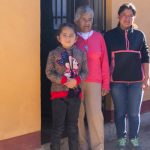The Xitimu Alvarado Family

On a typical Tuesday morning, you can find Marcedonio Xitimu Alvarado (31) surrounded by cucumbers. Every day, he and his dog, Oso, tend to his fields under the hot Rabinal sun, ensuring that each plant is weeded and watered. From watching his movements, it is difficult to believe that the current life he leads is completely different from his previous one.
“We had bought this land, and we said to ourselves, ‘what are we going to use this for?’” Marcedonio explains. “Then, we somehow picked up a cow, and now, we’re here.” Under the cool awning of his Habitat Guatemala house, he wipes the soil from his hands and forearms, his face shadowed by a faded baseball cap. When he looks up, a smile tugs at the corners of his mouth.

One day, while surveying their land, Marcedonio and his wife, María (31), saw an opportunity unfold before them. The couple decided to move to that same space of land, electing not only to build a house, but to transform the landscape. Their goal? To teach their two children, Jovanny (9) and María (6), the importance of being outdoors. “We want them to grow up in nature,” remarks María. Aside from their home, there are no neighbors nor paved roads in sight.
“Before, we lived in Zone 2, which is about ten or fifteen minutes away from here,” remembers Marcedonio. “It was my in-laws’ house, and we were there for about nine years. It wasn’t too crowded, but the house wasn’t in the best shape. And the city was congested.”

In a time where Guatemala is undergoing rapid-fire social and economic changes, Marcedonio and María have decided to return to agriculture. Their move is an experiment in self sustenance and environmental sustainability. Although they both have other jobs (Marcedonio works in security and María sells shoes), their family is committed to developing and transforming their lives. María comments, “Although it is hard work, and it takes us more time to get places, we are content where we are.”
Most importantly, both the home and farm have become their space of solace and contentment. “The area and environment is more beautiful, and here, our neighbors are birds. It’s a lot more private,” says María. Their fledgling farm is thriving. In three months, the couple plans to sell their cucumber and corn crop at the market in Rabinal. “Little by little, we have made this space feel like ours. There were no plants here when we started. Now, it is full of life,” says Marcedonio.
Steadily, Marcedonio and María continue to work on their home. In the next year, they hope to implement solar panels to save money on electricity. They are also investigating creative ways to install running water. However, they are happy with the journey so far and recollect upon the past with enthusiasm, especially regarding the group of volunteers that assisted with the construction of their home.



